新概念1lesson83
新概念英语 第一册Lesson 83

Lesson 83 –84Ⅰ. VOCABULARY1. pack1)打包,装箱We are going on holiday tomorrow and I am packing right now.2) 挤满,塞满The football fans packed the hall.3) package 包裹,包装2. mess n. 杂乱,(常常用单数)v.弄脏This room is a mess! You’ve made a mess of your job.in a mess 凌乱,肮脏You room is in a mess.3. leave 离开,剩下,留下It’s time for us to leave.ask for a leave 请假take French leave 擅自离开leave a place for another place 离开某地去某地The plane leaves Shenzhen for US.leave for a place 动身去……He will leave for Shanghai on business(出差).leave sb.sth alone 不要干涉某人某事Leave him alone.4. already 已经,用于肯定句,疑问句Have you done it already?yet 用于疑问句,否定句的句尾,含有“仍然”,“还没有”的意思。
Ⅱ.GRAMMER现在完成时:现在完成时是由“助动词have / has + 过去分词”构成的,其规则动词的过去分词构成与过去式相同 .1.表示过去发生或已经完成的某一动作或存在的状态对现在造成的影响或结果。
也就是说现在完成时虽与过去有关,但实际上看重的是对现在的影响或结果。
特点是动作不延续,因此,该时态只能与表示不定的过去时间状语(如:already,yet,before,recently等)、频度时间状语(如:never,ever,once等)、包括现在时刻在内的时间状语(如:this morning/month /year...,today等)连用。
新概念英语第一册83课件 (共42张PPT)
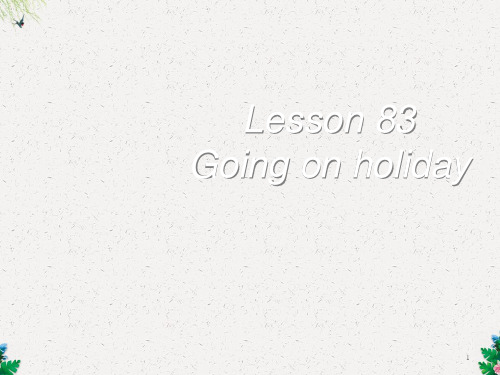
(现在完成时)
I had dinner at 5 o’clock. (过去时)
23
Would you like some juice?
No, thank you. I have (just) had a cup.
24
They had some ice-creams.
式)
39
Home work
1.背单词 2.P172 B部分练习 7-10
40
QUESTIONS
1. What did you do last summer vocation? 2. Was your last summer vocation a
pleasant one? 3. How did you spend your last summer
28
Have 词组大集锦
1 吃早饭 2 吃午饭 3 吃晚饭 4 度假
5 游泳 6 休息 7 高兴 8 抽一支烟 9 洗澡 10 拥有
29
现在完成时
构成: 主语 + have/ has+ 动词过去分词 注意:这里的have是助动词,无意义
have-had-had
30
We often use CONTRACTIONS with this tense.
25
Would you like some ice-creams?
26
No, thanks. I’ve had an ice-cream.
I had an ice-cream at four o’clock.
27
I have had…
I have had dinner. I had a cup. I have had an ice-cream.
新概念英语1-Lesson83-84
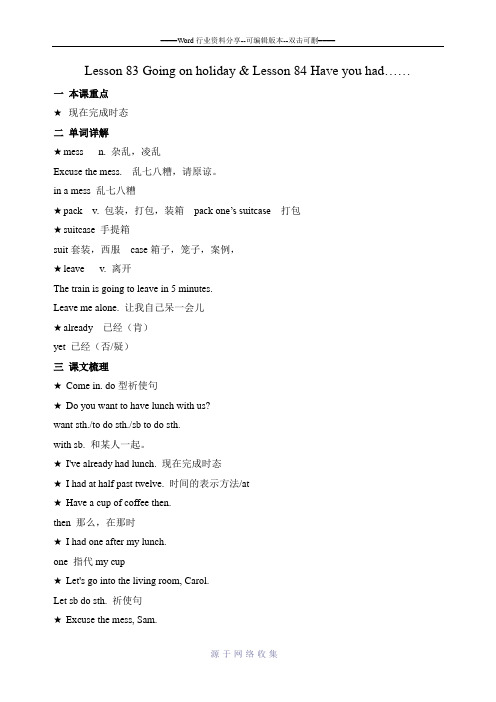
Lesson 83 Going on holiday & Lesson 84 Have you had……一本课重点★现在完成时态二单词详解★mess n. 杂乱,凌乱Excuse the mess. 乱七八糟,请原谅。
in a mess 乱七八糟★pack v. 包装,打包,装箱pack one’s suitcase 打包★suitcase 手提箱suit套装,西服case箱子,笼子,案例,★leave v. 离开The train is going to leave in 5 minutes.Leave me alone. 让我自己呆一会儿★already 已经(肯)yet 已经(否/疑)三课文梳理★ Come in. do型祈使句★ Do you want to have lunch with us?want sth./to do sth./sb to do sth.with sb. 和某人一起。
★ I've already had lunch. 现在完成时态★ I had at half past twelve. 时间的表示方法/at★ Have a cup of coffee then.then 那么,在那时★ I had one after my lunch.one 指代my cup★ Let's go into the living room, Carol.Let sb do sth. 祈使句★ Excuse the mess, Sam.Excuse me. 请原谅…★We’re going to leave tomorrow. = We’re leaving tomorrow.当动词是leave, go, come, arrive等时,可以用现在进行时表将来。
★Tom and I are going to have a holiday.人称代词排序be going to do sth. 一般将来时(表示计划、打算做某事)。
新概念英语第一册Lesson83-84笔记(语法点+配套练习+答案)
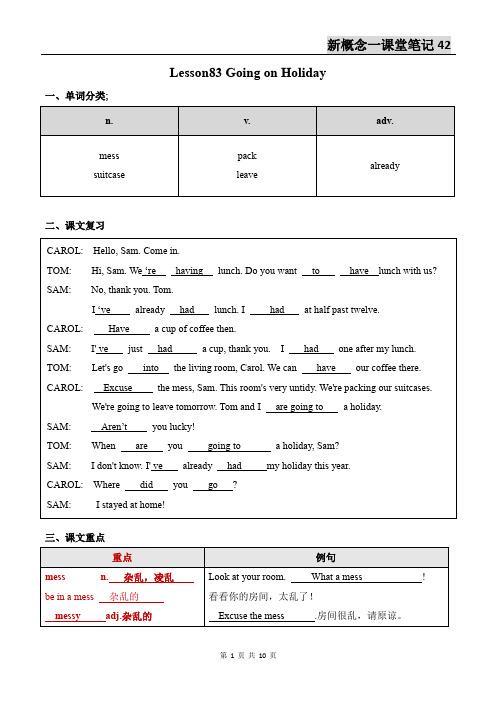
4、词组
1.go on holiday
2.have a holiday
度假
Excuse the mess.
乱七八糟,请原谅
have lunch
吃午饭
have tea
喝茶
hace a cup of coffee
喝杯咖啡
stay at home
2.She hasneverbeen to the UK.
3.Have theyeverread this storybefore?
4.I have seen this filmthree times.
5.Have you packed your caseyet?
结构:
1.主语+ have +过去分词
练习:(翻译)
1.I have already had a meal.我已经吃过饭了。
2.They have just finished their work.他们刚刚完成工作。
3.She hasn’t opened the door yet.她还没有开门。
4.Have you had breakfast yet?你吃过早餐了吗?
看看你的房间,太乱了!
Excuse the mess.房间很乱,请原谅。
Look at the room. It’sina mess.
It takes time to clean up thismessy(mess) house.
pack v.打包
suitcase n.手提箱
pack the suitcase收拾行李
2.He has already had some milk.
(完整版)新概念英语第一册Lesson_83课件

I don't know. I have already had my holiday this year.
你去哪儿了? 我呆在家里了!
9.Where did you go? I stayed at home.
packing their suitcase. 3. What are Carol and Tom going to do? They are going to have a holiday. 4. When are they going to leave? Tomorrow.
Answer:
Q1:What are Tom and Carol doing? They are having lunch.
1. in a mess
= at sixes and sevens 乱七八糟的(状态或局面) 你的房间乱七八糟的. Your room _is__in_a__m_e_s_s___. 2. What a mess ! 好乱啊!
mess
2) v.弄脏,弄乱 Messy adj. 凌乱的 A messy room Tidy 整洁的 Untidy 不整洁的 介词搭配 Mess in Mess up Mess about
Already 已经(一般放在助动词的后面) She has already arrived the bus stop. 她已经到了公共汽车站。
那么喝杯咖啡吧。我刚喝了一杯,谢谢。我是在饭后喝的。
3.Have a cup of coffee then. I 've just had a cup,thank you. I had one after my lunch.
新概念英语第一册单词 第83课:度假

新概念英语第一册单词第83课:度假 mess [mes] 杂乱,凌乱【派生词】messy凌乱的【单词搭配】mess up弄乱 mess in干预【单词例句】A: Look at your room. What a mess!A:看看你的房间。
多么乱呀!B: Sorry, I'II clean it soon.B:对不起,我马上打扫。
pack [p?k] 打包,装箱【派生词】unpack打开包裹backpack双肩背包【单词搭配】pack in塞入 pack up收拾【单词例句】A: Why do you leave so early today?A:你今天为什么那么早就离开?B: Because I have to pack the luggage tonight.B:因为我今天晚上要打包行李。
suitcase ['su?tke?s] 手提箱【单词例句】A: Please help me with the suitcase.A:请帮我放一下这个行李箱。
B: Do you mind me putting it in the trunk?B:你介意我把它放到后备箱去吗?leave [li?v] v离开【单词扩充】depart离开 come off离开【单词搭配】leave for离开去某地 leave alone不理会【单词例句】A:I won't leave here until next Monday.A:找下周一才会离开这儿。
B: Would you like to visit places ofinterest here these days?B:这几天你要不要参观这儿的名胜古迹昵?already [??l'red?] adv已经。
新概念英语第一册Lesson83

冯千禧五年级上第十五次课堂表现
日期 作业 态度 听力 2010年12月12日 完成得不错 上课态度认真 今天换了听力题型,感觉有点不知所措,单词的读音不够准确,星 期的读法、长短音的区分都需要加强练习。另外我一再强调的是注 意力永远集中在当下,千万不要趁读下一个题目的时候思考上一个 题目,你只会失去更多!!!! 模仿能力在需要继续提高。 今天学了现在完成时,需要和以前所学的时态进行区别记忆,要多 练习。 非常好,做了一个很完整详细的自我介绍。句型非常漂亮。 有很大进步,我很开心。 大部分可以,有个别语句运用得不是很熟练。
与现在完成时连用的时间状语
• Already 已经。一般用于肯定句中,在表惊讶 的时候也用于疑问句中 • Yet 还。用于否定句和疑问句中 • Just 刚刚 • Recently 最近 • So far 到目前为止 • For 持续…时间 • Since 自从… • 注意:现在完成时不与表过去的时间状语连用, 如yesterday ago last
过去分词
• 过去分词的变化规则与过去式一样,在词 尾加ed • 原形 过去式 过去分词 • Work worked worked • Regret regretted regretted • Type typed typed • Empty emptied emptied • Cry cried cried
现在完成时与一般过去时的比较
• 一般过去时强调的是过去某个特定时间发 生的动作或存在的状态。
• 现在完成时是表达在过去不确定的时间所 发生的动作对现在造成的影响和结果。这 个动作也许到现在已经结束,也许还要继 续下去。
例句比较
• • • • • • • • I had my breakfast at 8:00 in the morning. I have had my breakfast. He bought a new car last week. He has bought a new car. They lived in that city last year. They have lived in that city for ten years. She saw the film last night. She has seen the film with her family.
新概念一第83课
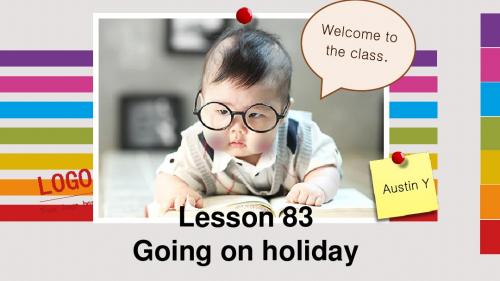
TEXT 01
TEXT 02 TEXT 03
TEXT 04
TEXT 05 TEXT 06 TEXT 07
LOGO
Your logo here
C: Hello, Sam. Come in. T: Hi, Sam. We're having lunch. Do you want to have lunch with us? S: No, thank you. Tom. I've already had lunch. I had lunch at half past twelve. C: Have a cup of coffee then. S: I've just had a cup, thank you. I had one after my lunch. T: Let's go into the living room, Carol. We can have our coffee there.
5、翻译:面对这一团糟,你打算怎么办? TEXT 06 TEXT 07
LOGO
Your logo here
★pack 英[pæ k] v. 包装,打包,装箱
① v. 打包,装箱 e.g: 在我17岁的时候,打起行囊离开了家。
② v. 挤满,塞满 The movie fans packed the hall. The bus is packeo here
1、mess /mes/ n. 杂乱,凌乱 2、pack /pæ k/ v.包装,打包,装箱 3、suitcase /‘sju:tkeis/ n. 手提箱 4、leave /li:v/ v. 离开 5、already /a:l'redi/ adv. 已经
新概念第一册Lesson83-84
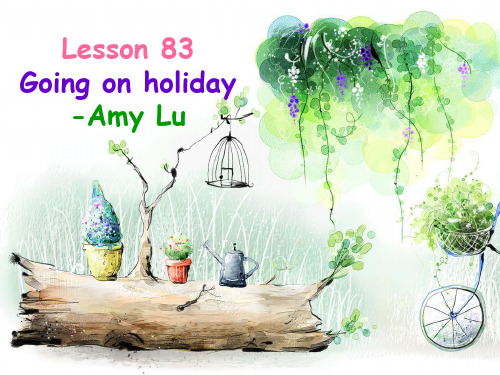
3) What are Carol and Tom going to do?
4) Where did Sam have his holiday?
CAROL: Hello, Sam. Come in.
TOM:Hi, Sam. We're having lunch. Do you want to have lunch with us?
TOM: Let's go into the living room, Carol.
We can have our coffee there.
22
CAROL:Excuse the mess, Sam. This room's very untidy. We're packing our suitcases. We're going to leave tomorrow. Tom and I are going to have a holiday.
What a mess! 真乱啊!
(2) v. 脏或乱的状态/把…弄乱 mess up 弄乱;弄糟
Don't mess up my clean floor. 别把我的干净地板弄脏了。
If you mess up you can try again. 如果陷入困境, 凌乱的,脏的
I have had lunch already. 我已经吃完午饭了。
I've already finished my homework. 我已经完成了作业。
2020/1/7
★ leave (left/left) [li:v]
新概念英语第一册83-84-86-85课课件
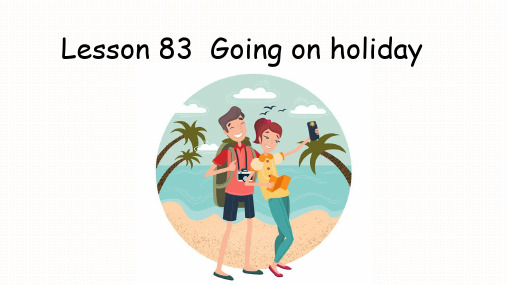
It’s old, but it’s very good.
3. What was the weather like in Paris in spring?
It was awful.
Read and act:
I have had some fruit. fruit
bananas
oranges
peaches
apples
vegetables
We have had some vegetables.
lettuce
cabbage
peas
beans
meat
He has had some meat.
beef
lamb
What has she done? She has aired the room.
What has she done? She has aired the room.
What has she done? She has aired the room.
What has she done? She has aired the room.
K: Yes, I have.
G: Wha2t's on?
K: ‘Paris in the Spring'.
G: Oh, I've alre3ady seen it. I sa4w it on television last year.
It's an old film, but it's very good.
Lesson 83 Going on holiday
New words
mess [mes]
新概念英语第一册第83
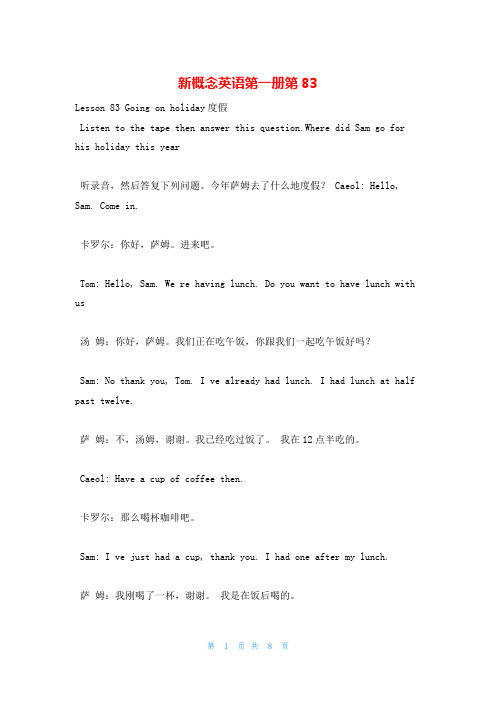
新概念英语第一册第83Lesson 83 Going on holiday度假Listen to the tape then answer this question.Where did Sam go for his holiday this year听录音,然后答复下列问题。
今年萨姆去了什么地度假? Caeol: Hello, Sam. Come in.卡罗尔:你好,萨姆。
进来吧。
Tom: Hello, Sam. We re having lunch. Do you want to have lunch with us汤姆:你好,萨姆。
我们正在吃午饭,你跟我们一起吃午饭好吗?Sam: No thank you, Tom. I ve already had lunch. I had lunch at half past twelve.萨姆:不,汤姆,谢谢。
我已经吃过饭了。
我在12点半吃的。
Caeol: Have a cup of coffee then.卡罗尔:那么喝杯咖啡吧。
Sam: I ve just had a cup, thank you. I had one after my lunch.萨姆:我刚喝了一杯,谢谢。
我是在饭后喝的。
Tom: Let s go into the living-room, Caeol. We can have our coffee there.汤姆:我们到客厅里去吧,卡罗尔。
我们可以在那里喝咖啡。
Caeol: Excuse the mess, Sam. This room s very untidy. We re packing our suitcases. We re going to leave tomorrow. Tom and I are going to have a holiday.卡罗尔:屋子很乱,请原谅,萨姆。
我们正在收拾手提箱。
明天我们就要走了。
新概念英语一册 Lesson83

Coffee
A: Have A:cup of a cup then. a Have coffe B: I have just had a cup, thank you. B: Just B: I had one after my lunch. B: after my lunch
Mess & packing
B: I stayed at home. B: stayed
Sunday October , 31st
Lesson 83
Ⅰ. New words & expressions • just 刚刚 • mess n. 杂乱 eg: excuse the mess 很乱,请原谅 很乱, • pack v. 打包 • suitcase n. 手提包,行李 eg: pack our suitcases 打包行李 手提包, 将要离开 • leave v. 离开 eg: be going to leave 将要离开 • lucky adj. Eg: Aren’t you lucky! 你们真幸运啊! 你们真幸运啊! <扩> unlucky adj. 不幸的 扩 7. already adv. 已经 用于肯定句和疑问句) 已经(用于 <扩> yet adv. 还(没),(用于否定句) ,(用于 扩 没 ,( eg: I have had my lunch already. 我已经吃完午饭了。 我已经吃完午饭了。 我还没吃午饭呢。 I haven’t had my luch yet. 我还没吃午饭呢。 Ⅱ. Sentences • We’ve just had a cup of coffee. = We have just had a cup of coffee. 2. This room is very untidy. = This room isn’t very tidy. 3. Aren’t you lucky!
新概念1-lesson 83

I have had some steak.ຫໍສະໝຸດ already, just
• I have already had my holiday. • 已经
• I have just had my holiday. • 刚刚
• • • • • • • • • • •
Have some beer. I have already had some beer. =I’ve Have an apple. I have already had an apple. Have some milk. I’ve already had some milk. Have a glass of water. I’ve already had a glass of water. Have a biscuit. I’ve already had a biscuit.
Have you had any apples? I haven’t had any apples. Have you had any peaches?
I have just had some peaches.
Have you had any apples or peaches?
tea
coffee
Lesson 83 Going on a holiday
现在完成时
• • • • • • • • 定义: 表达到目前为止已经做完的事情。 公式: 主语 + have/has + (done) 动词过去分词 Have/has: 助动词 动词的各种形式: do does doing did done have has having had had 动词过去分词:规则变化时,词尾 + ed.
新概念1 Lesson 83

1. 动词过去分词的构成?
如果一个动词的过去式是规则变化的,那么它的过去分词形式 与过去式形式相同。
look ---- looked ---- looked smile ---- smiled ---- smiled study---studied---studied 如果一个动词的过去式是不规则变化的,那么它的过去分词形 式也是不规则的 put ---- put ----put buy ---- bought ---- bought leave-left-left
I had lunch at half past twelve.
Where did you go? I stayed at home.
一般过去时
现在完成时
动词过去分词
I've already had lunch. I've just had a cup. 动词过去分词
主语+have+动词过去分词
现在完成时
I h_a_d__ one after my lunch.
Tom:Let's go _in_t_o_ the living room,Carol. We can _h_a_ve_ our coffee there.
Carol: Excuse the mess, Sam. This room's very untidy.
抢答环节
什么是现在完成时? 1.表示在说话_之_前__已经完成,而后果或影响至今_仍_存__在_的动作.
现在完成时的构成: 主语+_h_a_ve_+__动__词_过__去_分__词+其它。
主语+_h_a_s_+动__词__过_去__分_词__+其它。
新概念英语第一册83课

Recite and act the text:
hi where upstairs bath here nearly cigarette whisky dinner nearly seven lunch went beef matter again
Dictation
Grammar focus :
mess
n. 杂乱,凌乱的状态
1. in a mess = at sixes and sevens 乱七八糟的(状态或局面) 你的房间乱七八糟的. is in a mess Your room ____________. 2. What a mess ! 好乱啊!
★already adv. 1.我已经吃过早饭了。 I have already had my breakfast. already 用于肯定句 2.yet用于否定句或疑问句,表示还没有。 我还没有吃早饭。 I have not had my breakfast yet. 你吃过早饭了吗? Have you had your breakfast yet ?
2014-5-6
屋子很乱,请原谅,萨姆。 房间里乱七八糟。
5.Excuse the mess, Sam. This room 's very untidy.
3.
untidy
= messy tidy-untidy happy-unhappy comfortable-uncomfortable lucky-unlucky sure-unsure fair-unfair 单词前加“un”表示否定前缀
我们正在收拾手提箱。明天我们就要走了。
6.We are packing our suitcases. We are going to leave tomorrow.
- 1、下载文档前请自行甄别文档内容的完整性,平台不提供额外的编辑、内容补充、找答案等附加服务。
- 2、"仅部分预览"的文档,不可在线预览部分如存在完整性等问题,可反馈申请退款(可完整预览的文档不适用该条件!)。
- 3、如文档侵犯您的权益,请联系客服反馈,我们会尽快为您处理(人工客服工作时间:9:00-18:30)。
我已经给房间通过风了 I have aired the room 他已经看完这部电影了 He has watched the movie. 我们已经到达北京了 We have arrived in Beijing. 我已经吃过早饭了 I have had breakfast 助动词 “吃”
他已经度过假了 He has had his holiday. (have one’s holiday: 度假) 她已经理过发了 She has had a haircut. (have a haircut 剪发)
3. I’ve just had a cup. I had one after my lunch.
★ after lunch 现在 Just 刚刚, 放在肯定句中 位置: 通常在 have/has 后 他刚刚洗完澡 He has just had a bath. 我刚刚上完课 I have just had my lesson.
你做完作业了吗? Have you already done your homework? 他已经游玩泳了吗? Has he already had a swim? 2. Have a cup of coffee then. 那么就喝杯咖啡吧 then 1. 然后 2. 那么 Then no. 那就算了
4. Leave v. 离开 left – left He left yesterday. 5. Already adv. 已经
课文 1. I’ve already had lunch. I had lunch at half past twelve.
★ 时间 12:30 现在 Already 已经,放在肯定句、疑问句中 位置:通常在done前 他已经洗完澡了 He has already had a bath. 我已经上完课了 I have already had my lesson.
现在完成时态:主语 + has/have + done 疑问句:have/has 提前 否定句:have/has + not 你已经给房间通过风了吗? Have you aired the room? 他已经看完这部电影了吗? Has he watched the movie? 我们已经到达北京了吗? Have we arrived in Beijing?
你已经吃过早饭了吗? Have you had breakfast? 他已经度过假了吗? Has he had his holiday? 她已经理过发了吗? Has she had a haircut? 你没有给房间通风 You have not aired the room. 他没有看完这部电影 He has not watched the movie. 我们没有到达北京 We have not arrived in Beijing.
“动词 — 时态的核心” 动词原形 - do 现在分词 - doing 三单形式 - does 过去式 - did 过去分词 - done 用于现在完成时态
动词过去分词的变化 1)一般情况+ed, call – called; air – aired 2)以字母 e 结尾+d live – lived; love – loved 3)以辅音字母+y 结尾,变 y 为 i + ed try – tried; study – studied ; 4)辅+元+辅 (三明治结构),双写辅音字母+ed stop – stopped
时间
4. Aren’t you lucky! (L77)否定疑问句表肯定 = You are so lucky!
语法 在已经完成
语法 — 现在完成时态 主语 + have/has + done 真正的动词 帮助构成现在完成时结构:助动词(本身没有意思, 帮助其它动词) *主语为第一人称、第二人称、复数形式如 I, you, we, they, the students 助动词用 have形式; 主语为三单形式如 he, she, it, Lucy 助动词用 has 形式
总结: 1. 什么是现在完成时:截止目前为止已经完成 2. 结构:have/has + done 3. 过去分词的变化规则 4. 疑问句: have/has 提前 5. 否定句:have/has + not
Lesson 84
Have you had…? 你吃过…吗? eg. Have you had lunch? 你吃过午饭了吗? Have you had a swim? 你游过泳了吗?
NEW CONCEPT ENGLISH 1
LESSON 83
Vocabulary 1. Mess n. 杂乱,凌乱 It’s very untidy. 非常凌乱 Excuse the mess 很抱歉,我这很杂乱 2. Pack v. 包装,打包,装箱 pack the books into the case. 3. Suitcase n. 手提箱 suit 套装+case箱子出差把套装放进箱子里
拓展 -西方节假日
New Year’s Day 新年 Valentine’s Day 情人节 (Feb. 14th ) Easter Day 复活节 (the first Sunday after the full moon following the spring equinox) April Fool’s Day 愚人节 Halloween 万圣节 (Nov. 1st) Thanks giving Day 感恩节 (the last Thursday of Nov.) Christmas (Dec. 25th )
